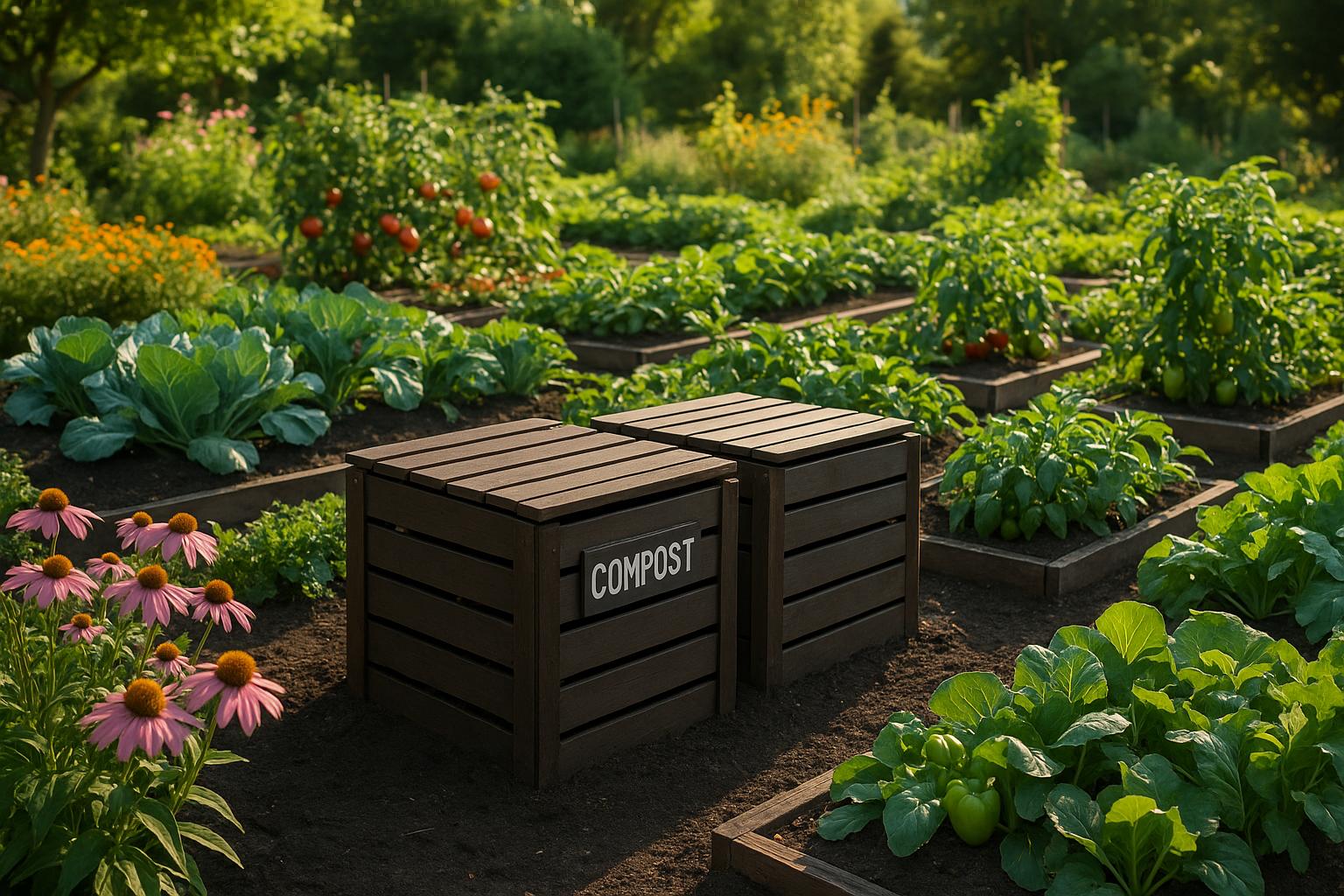- bhavya gada
- No Comments
Maryland has implemented detailed composting laws to reduce landfill waste, cut methane emissions, and promote organic waste recycling. Businesses and residents are encouraged to divert food scraps and yard waste to composting facilities, improving soil health and supporting local agriculture. Key regulations include mandatory food waste diversion for large waste producers and new residential composting requirements in some areas, like Laurel, starting July 2025.
Key Highlights:
- Business Requirements: Businesses generating at least 1 ton of food scraps weekly (as of 2024) must compost if within 30 miles of a facility.
- Residential Composting: Laurel mandates food scrap separation starting July 2025; other counties offer voluntary programs.
- Permitting & Reporting: Facilities need permits, and businesses must submit annual recycling reports.
- Support Programs: Counties provide subsidized compost bins, drop-off sites, and workshops for residents.
Maryland’s efforts aim to reduce landfill dependency, create jobs, and support sustainable practices through composting.
Food Waste Prevention Week Webinar : Maryland’s Wasted Food Policies (2024)
Maryland’s Statewide Composting Regulations
Maryland’s composting regulations are outlined under COMAR 26.04.13, which stems from House Bill 264 and Senate Bill 483. These rules officially took effect in December 2022, with a phased rollout starting in January 2023 [3]. The framework sets specific guidelines for waste generators and operational standards for composting facilities. Below, we’ll break down the main aspects of these regulations.
Main Requirements of Maryland Composting Laws
A key part of Maryland’s composting laws is the Food Waste Ban, which requires certain large-scale waste generators to divert organic materials away from landfills. This rule applies to businesses, schools, and institutions producing substantial amounts of food scraps and located within 30 miles of a permitted composting or anaerobic digestion facility [3].
The law’s implementation is phased. Beginning in January 2023, businesses generating at least 2 tons of food scraps per week were required to comply. By January 2024, the threshold was reduced to 1 ton per week, broadening the scope of businesses impacted [3]. This gradual approach allows time for adjustments within the system.
Currently, Maryland has 6 permitted composting facilities and 1 anaerobic digester [3]. The regulations apply to a variety of entities, including schools, grocery stores, and food service establishments – though restaurants are specifically excluded [3].
Starting in March 2024, covered businesses must file Annual Business Recycling Reports. These reports detail waste quantities, haulers used, and processing sites. Additionally, the reporting requirement will extend to all counties in Maryland [3].
Facilities and operators must obtain permits from the Maryland Department of the Environment (MDE) and adhere to strict construction, design, and record-keeping standards [1].
Home vs. Business Composting Rules
Maryland’s composting laws clearly differentiate between residential and commercial composting. Individual households are mostly exempt from the stringent rules applied to businesses [1].
Residents can compost at home using backyard bins or participate in local government programs without being subject to the permitting and reporting obligations imposed on businesses. This reflects the smaller scale and lower environmental impact of home composting.
Here’s a quick comparison of the two:
| Home Composting | Business Composting |
|---|---|
| Exempt from state regulations | Must comply if generating ≥1 ton/week within 30 miles of a facility |
| No annual reporting required | Annual recycling reports required for MDE and county authorities |
| Backyard bins and local programs allowed | Must arrange pickups with permitted haulers and meet operational standards |
Businesses affected by the Food Waste Ban must monitor their food waste output, confirm their proximity to permitted facilities, and arrange for waste collection through authorized haulers. They are also required to maintain detailed records and submit yearly reports documenting their waste diversion efforts [3].
Some local jurisdictions, like Laurel, have adopted stricter rules for residential composting, showing how local policies can vary [2].
How Laws Are Enforced
The Maryland Department of the Environment (MDE) oversees the enforcement of these composting laws. The agency issues permits, conducts inspections, and reviews reports submitted by businesses subject to the Food Waste Ban [1][3].
Local governments also play a critical role. Counties are responsible for regulating solid waste management and must update their comprehensive waste management plans every three years [9]. This dual oversight – state and local – helps ensure compliance.
Enforcement includes regular inspections, record audits, and penalties for violations. Businesses must retain waste diversion records for five years for potential audits [1]. Similarly, composting facilities must keep detailed records of incoming materials and their operations.
The MDE also addresses challenges like contaminated feedstock and compliance consistency. To help refine the system, the department reports these challenges to the General Assembly [1]. These reports allow regulators to identify problem areas and make necessary adjustments.
For businesses seeking to comply, the MDE provides extensive resources, while county authorities offer step-by-step instructions to meet reporting and diversion requirements [9].
Local Composting Programs in Maryland
Maryland’s counties and cities are stepping up to support state composting laws with local initiatives designed to divert organic waste from landfills and encourage more environmentally friendly practices.
County and City Programs
Prince George’s County provides weekly curbside collection of food scraps and yard trim every Monday, year-round[7]. This consistent service makes it easy for residents to participate without much hassle.
Montgomery County offers several options for food scraps recycling. Residents can use drop-off sites, participate in pilot curbside collection programs in select areas, or access educational resources to better understand composting practices[10].
Howard County has set up multiple food scrap drop-off sites and actively promotes backyard composting through educational outreach. These options cater to a variety of living situations, giving residents the flexibility to choose what works best for them[4].
Baltimore County operates several drop-off centers where residents can bring compostable materials. While the program primarily focuses on yard waste at some locations, the county is working to expand its services to meet growing demand for broader composting options[9].
The City of Laurel is taking a proactive approach with a new mandatory composting ordinance. Starting July 1, 2025, residents will be required to separate organic waste for composting[2]. To prepare for this change, the city’s Environmental Programs Manager offers presentations to homeowners associations and community groups, helping residents transition smoothly.
These county and city programs provide a strong foundation for community-driven composting efforts.
Community Composting Options
Community composting hubs are another important resource, offering neighborhood drop-off sites, school-based composting programs, and nonprofit-run facilities. These hubs are especially valuable in areas where municipal composting services are limited[5].
In addition to managing organic waste, these hubs often host educational workshops and provide volunteer opportunities, encouraging local involvement in environmental initiatives[5][8]. School-based programs are particularly impactful, combining food waste reduction with hands-on lessons in environmental science.
Many community composting efforts rely on volunteers and donations, complementing municipal programs by filling gaps in service and increasing overall access to composting.
These grassroots efforts not only support state regulations but also help boost organic waste diversion and raise awareness about sustainable practices.
Local Composting Service Comparison
Maryland’s composting programs differ in what they accept, how residents can participate, and where services are available. Here’s a quick comparison of key features:
| County/City | Accepted Materials | Participation Requirements | Service Area |
|---|---|---|---|
| Prince George’s County | Food scraps, yard trim | Weekly curbside pickup (Mondays) | Countywide |
| Montgomery County | Food scraps | Drop-off sites; pilot curbside in select areas | Countywide |
| Howard County | Food scraps, yard trim | Drop-off and backyard composting options | Countywide |
| Baltimore County | Primarily yard waste | Open to residents | Countywide |
| City of Laurel | Food scraps, green waste | Mandatory separation (starting July 2025) | City |
The types of materials accepted often depend on each program’s processing capabilities. For example, Howard County allows fruit and vegetable scraps, while Baltimore County may limit some sites to yard waste only[4][9].
Participation requirements also vary. Some programs require registration or proof of residency, while others are open to all residents[3][6]. Laurel’s mandatory composting ordinance represents a shift that other municipalities are watching closely.
For residents looking to integrate composting into their outdoor spaces, Pro Landscapes MD offers eco-friendly landscaping services across central Maryland. Their team can design composting systems that fit seamlessly into your property while keeping maintenance simple.
Through expanded services, educational programs, and community involvement, local composting initiatives are helping Maryland reduce waste and embrace more sustainable practices.
sbb-itb-843f8be
Resources and Support for Residents
Maryland residents have access to a variety of services and programs to make composting easier, from county initiatives to professional landscaping solutions.
Getting Composting Equipment
Many counties in Maryland offer subsidies to make composting equipment more affordable. For example, Montgomery County provides Backyard Compost Bins at discounted rates ranging from $20 to $50, with occasional free distribution events. Similarly, Howard County supports residents with discounted bins and equipment giveaways through its Department of Environmental Protection. Frederick County, along with others, collaborates with vendors to offer discounted composting tools. Residents can reach out to their local environmental office to learn about current promotions or equipment giveaways.
For those with limited space, compact options like worm bins or small tumblers are available. Additionally, shared composting sites or community gardens in some areas allow residents to drop off food scraps if home composting isn’t practical. Once equipped, residents can enhance their skills by attending local workshops.
Educational Workshops and Guides
The Maryland Department of the Environment (MDE) and county governments host free or low-cost workshops covering composting basics and advanced techniques. Residents can find upcoming events by visiting their county’s Department of Environmental Protection website or checking the MDE’s composting resource page. Many counties also maintain event calendars with registration details and offer virtual sessions for added convenience.
Montgomery County’s Department of Environmental Protection provides extensive resources in conjunction with its bin program. County extension offices offer additional support, including expert advice via helplines and online FAQs. Community centers and libraries often collaborate with local environmental groups to host composting events, making it easy for residents to learn and engage.
For those looking to take their efforts further, professional landscaping services offer tailored solutions for outdoor composting systems.
Professional Landscaping Services
Professional landscaping services can help Maryland residents incorporate composting systems into their outdoor spaces. For example, Pro Landscapes MD specializes in eco-friendly landscaping across central Maryland, serving counties like Howard, Montgomery, Carroll, Frederick, Prince George’s, and Baltimore. Their team customizes composting systems to fit specific property needs, ensuring proper placement, drainage, and seamless integration with existing features.
In addition to installation, Pro Landscapes MD advises on improving soil health through composting and selecting plants that thrive in compost-enriched soil. Their expertise extends to sustainable drainage solutions and environmental pavers, creating systems that effectively manage both organic waste and stormwater. Initial consultations help assess property requirements, ensuring the composting system is well-suited to the landscape.
| Resource Type | Provider | Typical Cost | Key Benefits |
|---|---|---|---|
| County-subsidized compost bins | Local government (e.g., Montgomery, Howard, Frederick Counties) | $20–$50 (sometimes free) | Affordable, accessible, and includes guidance |
| Educational workshops | MDE, county extension offices | Free or low-cost | Expert advice, hands-on learning, troubleshooting |
| Professional integration | Pro Landscapes MD | Varies (consultation often free) | Custom design, proper installation, seamless integration |
These resources make it easier for Maryland residents to embrace composting, whether starting with a simple bin or working with professionals to create a fully integrated system. With the right tools and support, everyone can contribute to the state’s efforts to reduce waste and improve environmental sustainability.
Benefits of Composting for Maryland
Composting offers a range of advantages for Maryland communities, touching on environmental, economic, and social aspects. As Maryland continues refining its composting regulations, these programs are proving to be more than just waste management solutions – they’re catalysts for local growth. From reducing landfill waste to creating jobs and supporting agriculture, composting is transforming challenges into opportunities for the state.
Reducing Waste Impact
In Maryland, 26% of landfill waste is organic material that could be composted[3]. Yet, only 18% of food waste is currently recycled, leaving plenty of room for improvement[3]. Composting helps address this issue by reducing methane emissions – common in landfills – and producing nutrient-rich compost. These soil amendments improve carbon storage, soil structure, and water retention[3][4]. For Maryland’s agricultural sector, this means healthier soil, less reliance on chemical fertilizers, and better crop yields.
The benefits don’t stop there. Compost-enriched soils retain water more effectively, reducing the need for irrigation. This is especially helpful for stormwater management, an ongoing challenge for many Maryland communities. Landscaping professionals, like Pro Landscapes MD, are already incorporating compost into sustainable designs to take advantage of these benefits[4].
Economic and Community Growth
Composting isn’t just good for the environment – it’s also an economic driver. Maryland’s growing composting infrastructure is creating jobs in areas like waste collection, processing, and facility management[3]. For example, Laurel’s mandatory composting ordinance is expected to lower municipal waste processing costs while encouraging community participation in organics recycling[2]. Savings come from reduced landfill tipping fees and fewer waste collection trips.
Local businesses are also reaping the rewards. The production and sale of compost support agricultural operations and landscaping services, creating a circular economy where waste is turned into a valuable resource[3][4]. Landscaping companies use locally-produced compost to improve soil and plant health, enhancing outdoor spaces across Maryland.
Community engagement thrives through shared composting programs. Prince George’s County’s curbside composting initiative has diverted large amounts of food scraps and yard waste from landfills, providing finished compost to residents and farms[7]. These programs not only reduce waste but also build environmental awareness, encouraging residents to take an active role in sustainable practices.
Composting vs. Landfilling Comparison
The differences between composting and traditional waste disposal methods are striking, especially when considering environmental, economic, and social factors.
| Benefit | Composting | Landfilling/Incineration |
|---|---|---|
| Greenhouse Gas Emissions | Low (aerobic process reduces methane) | High (methane from anaerobic decay) |
| Soil Health Impact | Enriches soil with nutrients and carbon | No benefit; may lead to contamination |
| Waste Volume Management | Significantly reduces landfill input | Continuously increases landfill volume |
| Economic Impact | Generates local jobs and revenue from compost sales | Ongoing disposal and remediation costs |
| Community Engagement | High through local programs and education | Minimal involvement |
| Resource Recovery | Converts waste into useful compost | No resource recovery |
Composting clearly outperforms landfilling. It reduces greenhouse gas emissions, enriches soil, and lowers landfill volumes, while landfilling organic waste generates methane and requires costly long-term site management[3]. Economically, composting can cut waste processing costs and even generate revenue, unlike landfilling, which involves ongoing expenses[2][3].
On a community level, composting fosters connections through drop-off sites, workshops, and shared gardens. Residents involved in these programs often report a sense of pride and satisfaction in contributing to Maryland’s sustainability efforts.
For property owners looking to make the most of composting, professional services can help integrate systems seamlessly into outdoor spaces. These eco-friendly solutions not only enhance landscaping but also align with broader environmental goals, benefiting communities across Maryland.
Conclusion
Maryland has taken significant steps to lead the way in composting, implementing regulations that address both residential and commercial waste. For example, the City of Laurel launched its mandatory composting program on July 1, 2025[2], while a statewide food residuals diversion law, in effect since January 2023, requires qualifying businesses to redirect organic waste away from landfills[6]. These initiatives not only help protect the environment but also lower municipal waste processing costs and create economic opportunities through job growth and compost production.
Residents have access to a variety of resources to support their efforts. Michele Blair, Environmental Programs Manager for Laurel, is available to provide guidance via email at greenliving@laurel.md.us or by phone at 301-725-5300. Additionally, the Maryland Department of the Environment offers detailed compliance guides to assist both residents and businesses[2][4]. With these tools, participating in composting becomes more manageable and impactful.
Maryland’s mandatory composting efforts go beyond regulation – they actively contribute to the circular economy. By reducing waste, residents and businesses can improve soil health and boost agricultural productivity. Companies like Pro Landscapes MD further support these goals by offering sustainable landscaping solutions, including eco-friendly designs and stormwater management systems that align with the state’s composting initiatives.
As Maryland continues to expand its composting requirements, with more municipalities likely to adopt similar programs and thresholds for businesses potentially decreasing, early adoption of sustainable practices will give communities a head start. Whether through community programs, professional landscaping services, or individual contributions, Maryland is steadily advancing its efforts to divert organic waste and promote a more sustainable future.
FAQs
What do Maryland businesses need to know about complying with the state’s composting laws?
Maryland has established clear regulations to promote composting and cut down on waste. Businesses must adhere to specific guidelines for disposing of organic materials, such as separating compostable waste from general trash and collaborating with licensed composting facilities. These measures are designed to reduce landfill reliance and encourage more sustainable practices.
For those interested in creating green outdoor spaces, Pro Landscapes MD provides professional landscaping and hardscaping services. Their team specializes in designing and maintaining eco-friendly landscapes, helping ensure your property reflects environmentally responsible practices.
What are some composting options for Maryland residents who don’t have space for a backyard bin?
If you don’t have the space for a backyard compost bin, don’t worry – there are still plenty of ways to get involved in composting in Maryland. Many local governments and community organizations provide food scrap drop-off sites or curbside composting services. A quick check with your county’s waste management services can help you find out what’s available in your area.
You might also explore services from private companies that collect food scraps right from your doorstep. For those in apartments or with limited room, indoor composting is a great option. Small worm bins (vermicomposting) or countertop composting systems are compact and perfect for tight spaces.
What are the benefits of composting for Maryland communities and local economies?
Composting brings a host of advantages to communities across Maryland, benefiting both the environment and the local economy. By converting organic waste into nutrient-packed soil, composting helps cut down on landfill waste, decreases greenhouse gas emissions, and supports environmentally friendly farming practices. Plus, it boosts soil quality, which can lead to more productive crops and healthier green spaces.
On the economic side, composting opens up job opportunities in areas like waste management, compost production, and related sectors. It also helps lower waste disposal expenses while encouraging eco-conscious habits that improve the quality of life for residents. Many counties in Maryland provide composting programs and resources, making it simple for individuals to take part in building a more sustainable future.


















Chat with Us